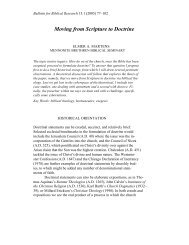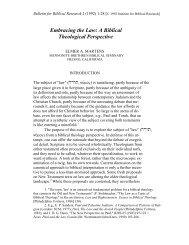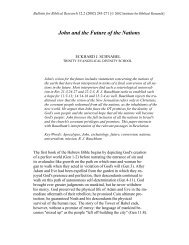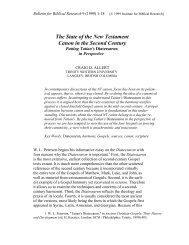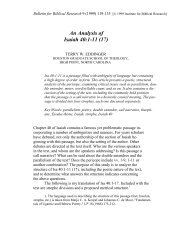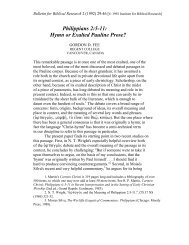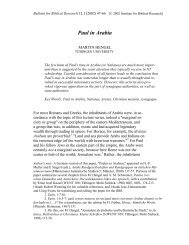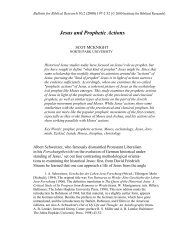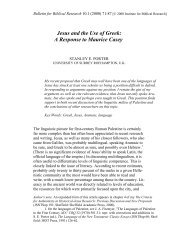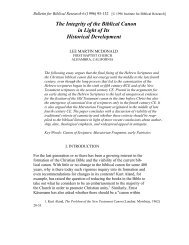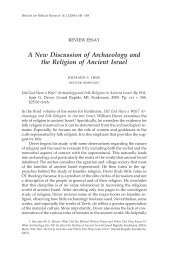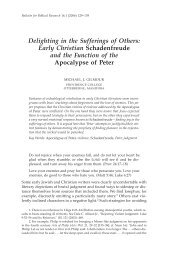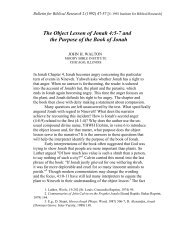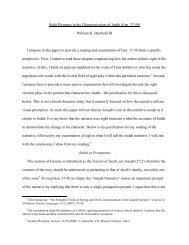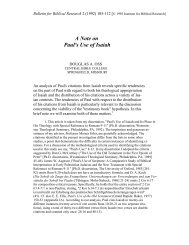Nota Bene-- C:\DOCUME~1\XPMUSER\MYDOCU~1\NBFILE~1 ...
Nota Bene-- C:\DOCUME~1\XPMUSER\MYDOCU~1\NBFILE~1 ...
Nota Bene-- C:\DOCUME~1\XPMUSER\MYDOCU~1\NBFILE~1 ...
You also want an ePaper? Increase the reach of your titles
YUMPU automatically turns print PDFs into web optimized ePapers that Google loves.
vis-à-vis Ephron in the first place (cf. חוה in 23:7, 12). 45 In other words, Abraham is not merely<br />
seeking their permission, for their legal participation is vital to the permanency the patriarch<br />
desires. Westbrook (following Boyer) suggests the section be read as a “tripartite transaction”<br />
which finds parallels in Akkadian at Ugarit, Boğazköy, and Mesopotamia during the same time<br />
period, and in earlier Elamite material (16c). In this situation the monarch functions as an<br />
intermediary, making the sale more secure by such involvement (Westbrook 1991, 32–34). 46 It is<br />
not difficult to see why this type of deed would appeal to a non-native desiring an enduring<br />
inheritance for the family name. If this is the background for Abraham’s request, later references<br />
to the purchase should reflect this important dimension and indeed they do. Abraham’s burial<br />
account (Gen 25:10) and Jacob’s burial request (Gen 49:32) both support this view with their<br />
focus on the Hethites as finalizing the transaction.<br />
In the financial dimension Ephron haḥittî sets the price of the property and receives<br />
payment from Abraham. A number of financial idioms appear throughout the passage, and all of<br />
them relate directly between Abraham and Ephron. 47 A cooperation then exists between three<br />
———————————<br />
45 For a supposed Hittite legal background see Lehmann (1953). For a supposed NB background see<br />
Tucker (1966). For an informative critique of these two proposals see Hoffner (1969, 33–37) and Westbrook<br />
(1991; cf. Singer 2006, 728). The general nature of the patriarchal account preserves parallels which are arguably<br />
present in both first and second millennia legal texts (Hoffner 1969, 37; Westbrook 1991, 34). HL §§ 46-47, to<br />
which the biblical account has been compared, are provided here for convenience, following Hoffner’s critical<br />
reading (1997, 54–58):<br />
§ 46 If in a village someone hold land (lit. fields) as an inheritance share, if the [larger part of] the land<br />
has been given to him/her, (s)he shall render the luzzi-services. But if the sm[aller part] (of) the land [has been<br />
given] to him/her, (s)he shall not render the luzzi-services: they shall render them from the house of his/her father.<br />
If an heir cuts out for himself/herself unused(?)/Idle(?) land, or the man of the village give land to him/her (in<br />
addition to his/her inherited land), (s)he shall render the luzzi-services (on the new land).<br />
§ 47b If anyone buys all the land of a man having a TUKUL-obligation, he shall render the luzzi-services.<br />
But if he buys only the largest portion of the land, he shall not render the luzzi-services. But if he carves out for<br />
himself idle/fallow land, or the men of the village give (him land), he shall render the luzzi-services.<br />
46 In Westbrook’s words: “[W]e suggest that the widespread existence in the latter half of the second<br />
millenium BCE of a legal fiction of double transfer, by sovereign as well as by property-owner, in cases where the<br />
long-term rights of the alienee to the land were to be particularly emphasized, might well give rise to the popular<br />
notion of the alienee acquiring the land both from sovereign and owner, either of which could be indifferently<br />
mentioned as alienator” (1991, 34).<br />
47 These are as follows: נתן (consistently used for “sell” and “buy”; 23:4, 9, 13, etc.), ְּבֶכֶסף ָמֵלא (“for full<br />
price”; 23:9), ֶּכֶסף ַה ָּׂשֶדה (“the price of the field”; 23:13), ַאְרַּבע ֵמ ֹאת ֶׁשֶקל ֶּכֶסף (“four-hundred shekels of silver”; 23:15,<br />
(“acceptable to the merchants”; 23:16). For the possible ֹעֵבר ַל ֹ ּסֵחר 23:16), money”; (“to weigh out ׁשקל + ֶּכֶסף 16),<br />
socio-economic dimensions of Abraham’s self-designation as a “foreigner” ;ּתֹו ָׁשב) 23:4), see Hamilton<br />
21



